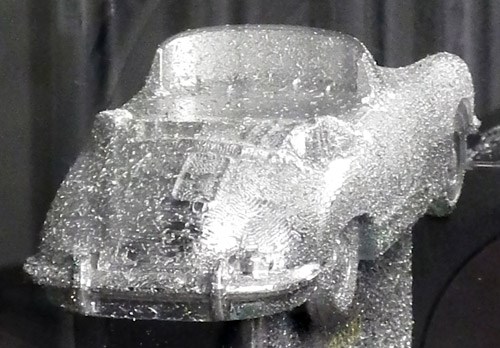Apprentices: Sustaining Our Industry
What is our plan to create our own source of skilled craftsman?
There is a lot of doom and gloom being bandied about concerning manufacturing, particularly here in North America. I, myself, am optimistic. While there are a number of examples I could provide, the evidence I present here has to do with our apprentices.
As long as I have been in manufacturing, I have heard the old hands decrying the knowledge, skills and different tools used by the newcomers to our trade. I remember being condemned as one who couldn’t use a slide rule (I could) because I was from the calculator generation.
Several of my recent experiences have shown me that this conventional wisdom has been turned on its head. I have seen some amazing things from apprentices, students and journeymen entering the trade.
NIMS Students and PMTS. At PMPA’s Precision Machining Technology Show in April, more than 150 students from the National Institute of Metalworking Skills (NIMS) were invited to see the exhibits and attend a few briefings. They spent the day engaged with exhibitors, learning all about the technologies, processes and applications of their products and the industry.
This was not just a kick the tires meet and greet. Exhibitors told me that the student questions were among the most challenging and insightful they fielded over the three-day exhibition.
The intensity of this year’s student attendees was quite different from years past. The NIMS students really seemed to know that there is a bright future filled with opportunity for them if they have the skills and if they put their time to use at PMTS to gain further knowledge of the industry and it processes.
F1 In Schools — Pennsylvania State Championship. Pennsylvania has a great start on talent ready to step into advanced manufacturing jobs. I learned this as a judge at the State Championships of F1 In Schools. Teams from both middle schools and high schools competed in the full-day event where they displayed, raced and discussed their projects.
The projects involved CO2 - powered race cars the students designed, machined and finished to a demanding specification. The cars started as sketches and were then designed on AutoCAD systems, then were converted into CAM files. The files then drove CNC routers to change a single block of wood into a racer.
Do not underestimate the abilities of this generation of potential manufacturing talent. I had a nice discussion with a fifth grader who knew his car’s drag coefficient to the fifth decimal place. He knew why that level of precision was not as important as the reduction of that number.
The students learned about team building, sales and marketing, business planning, AutoCAD design, Computer-Aided Manufac-turing, CNC machining and wind tunnel testing, as well as data-driven modification of design, finishing and meeting all dimensional/feature call-outs. These students will be on the fast track wherever they go.
Update: Team Ninja’s, from Elizabethtown, Penn., won the National F1 in Schools Champion-ship and will represent the United States in the world finals in Singapore. How’s that for an indication of the quality of our potential new hires down the road?
My Latest Journeyman Encounter. I was privileged to attend the 2011 Technical Days at Paul Horn GmbH in Tübingen, Germany, in May. On the plant tour, I visited and watched the current group of apprentices working on their demanding and escalating-in-difficulty projects.
Small shops might not have a research and development budget. But smart shops do, and they use it to develop their people’s skills and abilities. Paul Horn has a constant 15 apprentices in its system.
At the first stop on the Horn factory tour, I met a March graduate of the company’s apprentice program. Herr Motawalli was operating a Hermle 40U five-axis vertical CNC machining center.
He was milling a 1:18 scale model of a sports car from a single piece of aluminum with 3,799,712 lines of code.
This was a high-visibility assignment and the work products—model sports cars—were to be given away to guests as part of a drawing. So the importance of the work was undeniable. While the machine was five-axis, the geometry of the product required very high degrees of freedom to create the details needed. This was certainly journeyman work. For a recent graduate to be working on such equipment and on this task showed me the thoroughness of the Horn program.
I met other recent graduates from the apprenticeship program throughout the tour and was similarly impressed by their difficult work materials, challenging geometries and sophisticated machine tools.
As precision machining shops, it is easy for us to get confused as to the true foundation of our industry. Is it the technology? Is it better tools and materials? What is the foundation of our craft?
My experiences with the NIMS students at PMTS, F1 In Schools and the recent apprenticeship graduates at Horn illustrate the real foundation of our craft and businesses—our journeymen machinists. As with any other precious resource, we must have a plan to obtain, sustain and grow them.
As baby boomers continue to leave the workforce, the need for competent machinists in the precision machining industry will only be magnified. What is our plan to create our own source of skilled craftsmen? How can we afford to not have such a plan? What are you doing to create the apprentices your shop will require if your business is to be sustained beyond the retirement of your current craftsmen?
Read Next
Do You Have Single Points of Failure?
Plans need to be in place before a catastrophic event occurs.
Read More5 Aspects of PMTS I Appreciate
The three-day edition of the 2025 Precision Machining Technology Show kicks off at the start of April. I’ll be there, and here are some reasons why.
Read MoreA Tooling Workshop Worth a Visit
Marubeni Citizen-Cincom’s tooling and accessory workshop offers a chance to learn more about ancillary devices that can boost machining efficiency and capability.
Read More.png;maxWidth=970;quality=90)














.png;maxWidth=300;quality=90)




